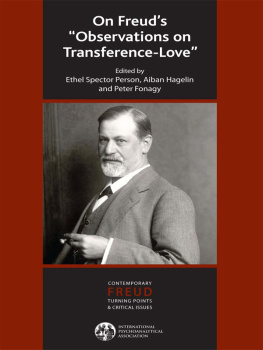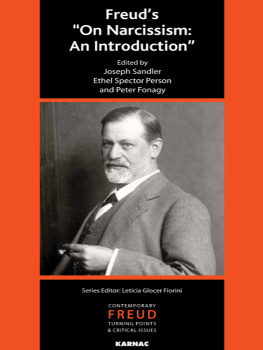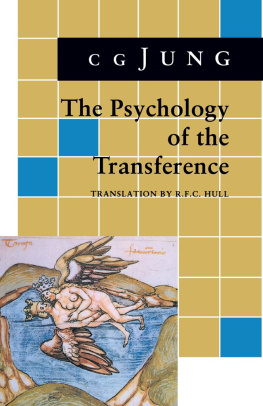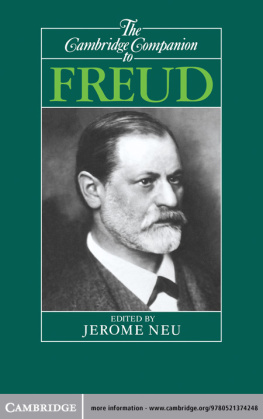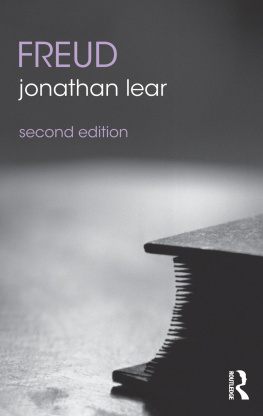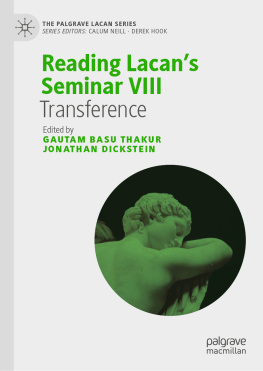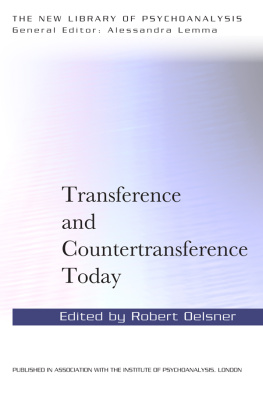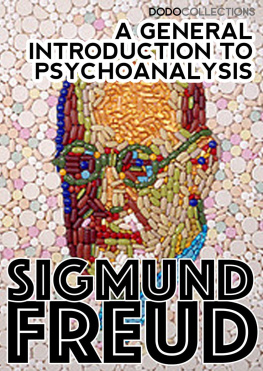A Rereading of Freud's Observations on Transference-Love

FRIEDRICH-WILHELM EICKHOFF
Lead the way for Europe's kings!
Give freedom of thought!
Friedrich Schiller,
Don Karlos
Freud's inspired paper of 1915, originally entitled Further Recommendations on the Technique of Psychoanalysis, is scarcely ten pages long, but to this day it occupies an outstanding place in the debate on the curative significance of the interpretation of psychical conflicts versus direct emotional experience. Freud, in this paper, methodically establishesin the context of discussing a countertransference resistance in the face of the socially untamed passion of the erotic transference of a fictitious female patientthe fundamental principle of the analytic treatment being carried out in abstinence, tracing this moral prescription back to its source, namely to expediency. Freud sees this fundamental principle as closely linked with the neutrality acquired by keeping the countertransference in check. He formulates the aim of psychoanalysis as achieving the extra piece of mental ) suggests that he was well aware of his own revolutionary impetus. He wrote to Karl Abraham on 29 July 1914, I have become more honest, bolder and more reckless (Freud and Abraham, 1965).
THE DISCOVERY OF TRANSFERENCE LOVE
The discovery of transference love belongs to the historical context of the cathartic treatment of Anna O. by Josef Breuer (Freud and Breuer, 189395, 2147) between 1880 and 1882, on which Freud, from the perspective of a supervisor, so to speak, gave an interpretive reconstruction in 1893. With the passing of time this interpretation had come more and more under the influence of his theory of transference (Hirschmller, 1978, 170). In his lectures at Clark University he pays detailed attention to the preliminary phase of the treatment, in which he had not been involved, and interprets the young woman's symptoms as signs of the memory of her father's illness and death: Thus they correspond to a display of mourning (Freud, 1910a). In On the History of the Psychoanalytic Movement (1914) he cites the transference of Anna O. as the untoward event that alarmed Breuerwho had failed to notice the universal nature of this unexpected phenomenonand caused him to break off the treatment. In the Autobiographical Study (1925) Freud writes of the patient's condition of transference love, which Breuer had not connected with her illness; he had therefore retired in dismay. In a letter to Stefan Zweig in 1932 (Freud, 1960a, 428) he finally mentions that after the conclusion of the treatment the transference love had expressed itself in a false pregnancy: On the evening of the day on which all her symptoms had been overcome he [Breuer] was called to her again, found her confused, writhing with abdominal convulsions. Asked what was the matter with her, she answered: Now the baby I'm expecting from Dr. B. is coming. At that moment he had the key in his hand that would have opened the waybut he dropped it. He had, with all his great intellectual gifts, nothing Faustian in him. (Translation by R. K.) Freud never officially published this reconstruction but wrote respectfully in an obituary for Breuer (1925b) that a purely emotional factor had given him an aversion to further work on the elucidation of the neuroses. He had come up against something that is never absentthe patient's transference onto her physicianand he had not grasped the impersonal nature of the process. However, in the Observations on Transference-Love Freud blames Breuer's retirement from our common work for holding back the development of psychoanalytic therapy during its first decade (159).
In line with Freud's remark in The Interpretation of Dreams (1900) that Everything that can be an object of our internal perception is virtual, like the image produced in a telescope by the passage of light-rays (611), the universal, impersonal nature of transference can be characterized as virtual (Eickhoff, 1987). There is evidently a conceptual identity between the transference of the intensity of unconscious ideas onto preconscious ones, as defined in The Interpretation of Dreams (562), and the transference on to the physicianthrough a false connection referred to in Studies on Hysteria (Freud and Breuer, 189395, 302). Freud remarks on the former view: Here we have the fact of transference, which provides an explanation of so many striking phenomena in the mental life of neurotics (1900, 56263). According to Laplanche and Pontalis (1973), transference is the repetition of infantile prototypesexperienced with a strong sense of immediacy (455). Sandler, Dare, and Holder (1973) define it as a specific illusion which develops in regard to the other person, one which, unbeknown to the subject, represents in some of its features a repetition of a relationship towards an important figure in the person's past (47).
Freud writes most unequivocally on the therapeutic indispensability and universal character of transference love in his Delusions and Dreams in Jensen's Gradiva (1907): The process of cure is accomplished in a relapse into love, if we combine all the many components of the sexual instinct under the term love; and such a relapse is indispensable, for the symptoms on account of which the treatment has been undertaken are nothing other than precipitates of earlier struggles connected with repression or the return of the repressed, and they can only be resolved and washed away by a fresh high tide of the same passions (90). He compares the cure in Jensen's novella of the archaeologist Norbert Hanold by the forgotten playmate of his childhoodof whom the ancient relief of Gradiva reminded himwith the more modest expedients and substitutes of which the doctormakes use to help him to approximate with more or less success to the model of a cure by love which has been shown us by our author.
An intermediate stage relevant for the understanding of transference love in the development of the theory of transference is the Fragment of an Analysis of a Case of Hysteria (1905), in which Freud characterizes transference as the final production of the patient's persistent illness: It may be safely said that during psycho-analytic treatment the formation of new symptoms is invariably stopped. But the productive powers of the neurosis are by no means extinguished; they are occupied in the creation of a special class of mental structures, for the most part unconscious, to which the name of transferences may be given (116).
In the postscript Freud attributes Dora's premature breaking off of the treatment to his own failure to interpret the transference (I did not succeed in mastering the transference in good time). Freud had begun to perceive this as a technical problem. Dora acted out instead of remembering: In this way the transference took me unawares, and, because of this unknown quantity in me which reminded Dora of Herr K., she took her revenge on me as she wanted to take her revenge on him, and deserted me as she believed herself to have been deceived and deserted by him. Problematizing the interpersonal distance of his method, and without considering the complicity with Dora's father, which might have answered his question as to the unknown quantity, Freud wonders: Might I perhaps have kept the girl under my treatment if I myself had acted a part, if I had exaggerated the importance to me of her staying on, and had shown a warm personal interest in hera course which, even after allowing for my position as her physician, would have been tantamount to providing her with a substitute for the affection she longed for? In a footnote Freud subsequently laments his failure to discover in time and to inform the patient that her homosexual (
Next page
